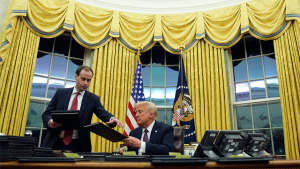Europe and Asia Respond to Trump's Return
 Play Video
Play Video
About This Episode
On Monday, European leaders watched the inauguration of President Donald Trump from Davos and fretted about his threats to impose sweeping tariffs, his demands for significant increases in European defense spending, and the possibility he may shift America’s stance toward Ukraine. He already has followed through on withdrawing from the Paris climate agreements and the World Health Organization. Soon after the inauguration, newly sworn in Secretary of State Marco Rubio met with foreign ministers of the Quad countries - Australia, India, and Japan – in an indication that countering China’s influence remains a top priority for Trump. How are European and Asian nations adapting to shifting geopolitical and economic dynamics in a new Trump era? Ken Moriyasu, Catherine Philp, and Prashant Rao join Ivo Daalder on this week’s World Review to analyze how Europe and Asia are responding to Trump’s return to office. They’ll also discuss the Gaza ceasefire and whether it is likely to hold.
While we encourage you to watch or listen to the episode (and subscribe wherever you get your podcasts!), these are Ivo's top takeaways from today's discussion:
- On Monday, Donald J. Trump was sworn in as 47th president of the United States – only the second person ever to return to office after having been defeated for reelection. And he’s made his presence felt. In what sounded more like regime change than a transfer of power, Trump used his inaugural address to declare his return a “day of liberation.” He then signed nearly 200 executive actions to put his own stamp on the government. Many have been stunned, not least those watching from abroad. In Europe, different countries have reacted differently. Some, like Meroni’s Italy and Orban’s Hungary, welcome the emergence of a leader very much in their own mold, although even they have questions about the impact of tariffs and the degree of Trump’s commitment to Europe’s security. Others, including leaders in Brussels, are trying to forge a response that seeks to meet Trump halfway. In Britain, meanwhile, officials are expressing quiet confidence that London’s relations with Washington will turn out fine. But as Prashan noted, that may be too optimistic. No one really knows what Trump will do next. The best thing for Europe is to take Trump at his word, and develop a posture and a response that works with Washington when it can, but opposes it where it must.
- In Asia, meanwhile, reactions have been more measured. Ken pointed out that Japan sees Trump’s return as the end of America’s commitment to the values of the rules-based order, which for decades has been the guidepost for Japan’s engagement in the world. Tokyo doesn’t believe this will be temporary, but is preparing for 12 years of Trump-Vance, believing the Democrats have no real answer to the Republican turn. What Tokyo fears most, however, is Trump deciding to make a deal with China’s Xi Jinping at the expense of Asia’s and Japan’s interest, especially when it comes to Taiwan. It isn’t at all clear, though, that Trump or Xi are interested in the kind of G2 world Tokyo fears. Trump may be more interested in dividing the world in spheres of influence, letting China dominate Asia in return for the US dominating the Western Hemisphere. China, meanwhile, may see advantages in the US retreat from global institutions and seek to exert greater influence and control at US and western expense.
- Trump’s return was the main, but not the only news this week. On Sunday, phase One of the Gaza ceasefire went into effect – silencing the guns for the first time in more than a year. Hostages and prisoners have started to be released. Aid is flowing back into the strip. And Gazans are trying to see if their homes are still intact. But the big question everyone is asking: will the ceasefire become permanent or will war resume in little more than five weeks’ time? Catherine suggested that Israeli politics will make it difficult to turn the ceasefire into a lasting end to the war. Already, two far-right members have left the Israeli cabinet and more are threatening to follow suit if Israel does not resume the fighting once the first phase ends. One disquieting sign is that the Israeli Defense Forces have launched a major new operation in Jenin on the West Bank, perhaps in part to satisfy those on the far right who would like to annex the territory to Israel. The one unknown is what Trump will do. He’s claimed full credit for getting the deal. Will he accept that some hostages may not be released because Israel restarts the war?
That’s it for Ivo's quick takes of this week’s episode. To get the full flavor, please watch or listen to the episode.
Prefer to Listen?







